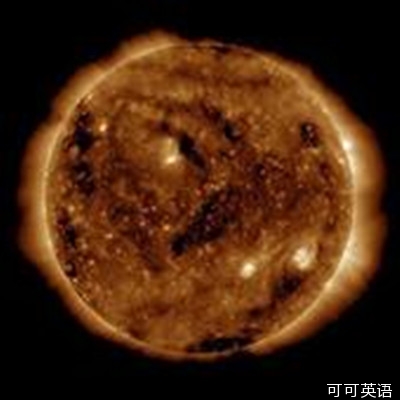Business
商业报道
Solar tariffs
太阳能关税
Sunspots
太阳黑子
American tariffs on Chinese solar panels are dangerous and pointless
美国针对中国太阳能电池板的关税是危险且无意义的
SOLAR energy is at a delicate,maybe historic, moment.
太阳能正处于一个微妙的、抑或是意义重大的关头。
The cost of the glassy photovoltaic panels that generate most solar electricity—by freeing electrons from a semi conducting material such as silicon—is plummeting.
透亮的光伏电池板花费正大幅下降,它们通过从半导体材料中释放出电子而生产了大多数的太阳能电力。
In the past four years their average cost has fallen by more than 75%.
过去四年当中它们的平均花费跌去了75%以上。
At less than $1 per watt of generating capacity, solar is now the cheapest power source in some sunny places, especially those, like India, that lack fossil-fuelled alternatives.
每发1瓦特电量只需不到1美元,太阳能现在是一些光照充足地区最廉价的能源,尤其是在那些缺少化石燃料替代物的地方,比如印度。
This is starting to look like a revolution.
这开始看起来像是一场革命。
Everyone who wants a reliable and nonpolluting energy supply, you would think, would welcome that.
你也许会想,每一个想要可靠且无污染的能源供给的人都将欢迎它。
But on May 17th America's Commerce Department slapped a provisional tariff of 31% on 61 Chinese makers of solar panels, including some of the cheapest in the business.
然而5月17日美国商务部对61家中国的太阳能板制造商强征31%的临时性关税。
 Another group of unnamed Chinese solar companies, which failed to respond satisfactorily to the department's inquiries, were hit with a 250% tariff.
Another group of unnamed Chinese solar companies, which failed to respond satisfactorily to the department's inquiries, were hit with a 250% tariff.
另一批未被提及的中国太阳能公司则因未能对该部门的询问给出满意的答复,受到了250%的关税的打击。
These duties, which are expected to be confirmed in October, were in response to an anti-dumping complaint from seven solar firms including Solar World, a German company with operations in America.
预计将于10月被批准,这些关税是针对一起由7家太阳能公司提起的反倾销诉讼所做出的回应,当中包括一家在美国运营的德国公司SolarWorld。
China's panelmaking industry has seen explosive growth, fuelled by strong demand, mainly from Europe, but also by soft loans from state-owned lenders.
在强劲的需求以及国有出借方的宽松贷款刺激下,中国的电池板生产行业经历了爆炸式增长。
Chinese panelmakers are reckoned by Bloomberg New Energy Finance, a research firm, to be able to make panels for around 10% less than the industry's average cost.
研究公司彭博新能源财经认为,中国的电池板制造商能够以低于行业平均成本10%左右来生产电池板。
They have undercut European and American producers:
他们正用低价策略削弱欧美制造商:
between 2009 and 2011 the value of American imports of cheap Chinese panels soared from $640m to $3.1 billion.
在2009年到2011年间,美国进口的廉价中国电池板的货值从6400万美元激增到31亿美元。
This has brought misery to higher-cost producers,
这让高成本的制造商处境艰难,
which a recent slowdown in demand for solar panels, caused mostly by reductions in European and American subsidies, has greatly exacerbated.
而近期主要受到欧美补贴减少的影响,太阳能电池板需求放缓,更是雪上加霜。
Many solar firms, Chinese and otherwise, are now furiously selling inventory—the bane of an industry where prices are falling—at a loss.
许多太阳能公司都在亏损,中国的还是其他地方的,都正在亏本极力消化库存,而价格下跌是一个行业灾祸降临的原因。
Some have gone bust, including recently a clutch of once-pioneering German firms such as Solarhybrid, Solon, Solar Millennium and Q-Cells.
一些公司走向破产,包括最近的一撮昔日里先驱级的德国公司,比如Solarhybrid,Solon,Solar Millennium,以及Q-Cells.
The American tariffs, if confirmed, will annoy Chinese panelmakers—and perhaps a wide array of American exporters, too, if China's “strongly dissatisfied” government launches retaliatory measures.
美国的关税如获批准,将会惹怒中国的电池板制造商,而如果中国“强烈不满”的政府展开报复性措施的话,被惹怒的也许还有大批的美国出口商。
But they are unlikely to save many Western solar firms.
但是关税不太可能拯救太多西方国家的太阳能公司。
The tariffs were long mooted, which has allowed Chinese exporters to build large inventories in the United States.
关税有很长的酝酿期,这让中国的出口商在美国积攒了大量库存。
Some developers of American solar projects have also signed precautionary deals, committing their Chinese suppliers to covering the cost of the mooted tariffs.
一些美国的太阳能工程开发商也签订了预防性交易,答应替他们的中国供应商承担长期的关税成本。
The most integrated Chinese solar firms,
中国最完善的太阳能公司,
such as SunTech, the world's biggest panel-maker, could probably stomach this, because panels represent less than a quarter of the cost of installed solar generating capacity.
比如世界最大的电池板生产商尚德,可能能够承受的了,因为电池板只占太阳能发电设备安装费用的1/4以下。
Financing, installation and other infrastructure costs account for the rest.
其余的成本在融资、安装以及其它基础设施上。
They will also look to make or buy panels in other Asian manufacturing hubs, such as Taiwan and South Korea.
他们同样会寻求在其他亚洲制造业中心,比如台湾、韩国,去生产或购买电池板。
These panels will not be subject to the tariffs, even if they are assembled into solar modules in China.
这些电池板不受关税影响,即便它们是由在中国制造的太阳能原件组装而成。
Whatever the legal merits of SolarWorld's complaint, America will help neither the planet nor its own domestic consumers by shutting out Chinese solar panels.
无论SolarWorld公司的控告在法律上有何优点,美国将中国的太阳能电池板拒之门外既不会帮到这个星球,也不会帮到自己国内的消费者。
And, predicts BNEF's Nat Bullard, the tariffs will not even do much to protect American solar firms.
而且据BNEF's Nat Bullard预计,关税甚至不会对美国的太阳能公司提供多少保护。












